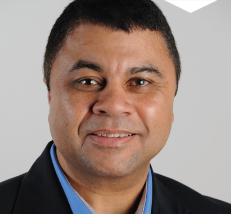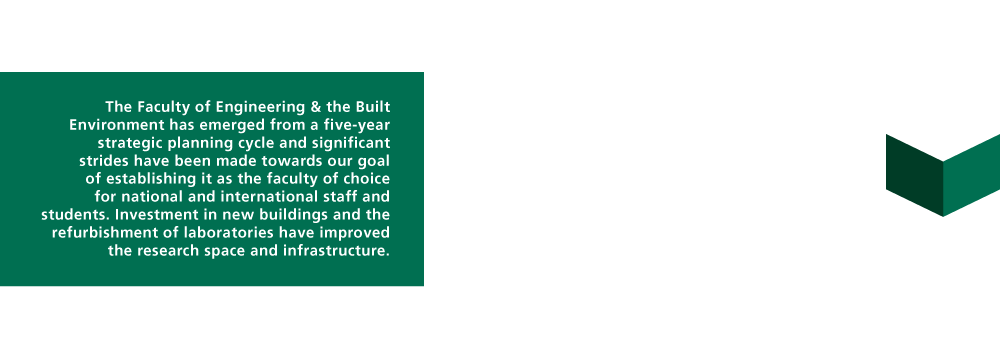 DEAN’S REPORT
DEAN’S REPORT
Professor Francis Petersen
Having a strong and internationally competitive research and innovation agenda will always be at the heart of strategic planning for the faculty.
Research in the Faculty of Engineering & the Built Environment continues to go from strength to strength. In the past year, a number of sophisticated analytical instruments have been purchased to assist various research groups in their work. The Department of Chemical Engineering received a new R14 million FEI QEMSCAN (quantitative evaluation of minerals by scanning electron microscopy) 650F as well as a high-resolution scanning electron microscope.
The new geotechnical laboratory in the Department of Civil Engineering has recently gone from a manual laboratory to a fully automated one, thanks to a grant from the Department of Higher Education and Training and the University Equipment Committee. The Department of Electrical Engineering has purchased a R3.5 million 10 MHz to 67 GHz Agilent PNA-X N5247A network analyser, which is an instrument used to measure and characterise electronic devices, antennas and systems, such as components and systems relating to radar, radio astronomy and telecommunications.
The high quality of research in the faculty is reflected in an increase in the number of peer-reviewed publications in international journals, and the international recognition that members of staff enjoy in their areas of research. A number of staff received international awards for their research, have been elected onto committees of local professional bodies, and serve on the editorial and advisory boards of various international journals and conferences. Clinton Hindes and Liana Müller (School of Architecture, Planning and Geomatics) received an Award of Excellence in the category “Publications and Research” from the Institute for Landscape Architecture of South Africa for the book pair South African Landscape Architecture: A compendium and A reader. Dr Denis Kalumba (Department of Civil Engineering) was appointed to the South African Bureau of Standards national working committee to draft the new South African Geotechnical Design Standard. The best presentation award at the World Gold Conference in Brisbane went to Dr Megan Becker (Minerals to Metals Initiative, Department of Chemical Engineering). Associate Professor Neil Armitage (Department of Civil Engineering) received an award from the Water Research Commission for “Human Capital Development in the Water and Science Sectors”.
Interdisciplinary thinking and activity have become firmly embedded in the objectives of the Centre for Research in Computational and Applied Mechanics (CERECAM), which has grown into a research centre comprising 13 full-time academic staff members from six departments and three faculties. In 2013, CERECAM had 21 doctoral and 14 master’s students, who were drawn from all the member departments.
The DST/NRF South African Research Chairs Initiative (SARChI) is a flagship initiative of government designed to attract and retain excellence in research and innovation at South African universities. The faculty is proud that its total number of DST/NRF SARChI chairs increased to seven when Professor Arnaud Malan took up his chair in 2014. Four additional research chairs in the faculty are supported by industry.
The DST/NRF Centre of Excellence in Catalysis (c*change) has undergone its second five-year review and the DST/NRF has confirmed an additional five years of funding. A total of 20 projects were funded during the course of 2013, of which 13 were multi-institutional and/or interdisciplinary projects. The centre has been awarded a DST/NRF SARChI Chair, which is expected to boost its scientific output.
National Research Foundation (NRF) ratings in the faculty have grown significantly over the past years, with 51 rated researchers at the end of 2013. It is exciting to see such a high number of young academics who have received ratings for their research and that the participation in the Emerging Researcher Programme continues to grow: a total of 79 researchers from the faculty have participated in the programme to date. The number of research contracts has increased significantly from 295 in 2012 to 395 in 2013.
There has been a drive to grow our research and innovation output and with this in mind, a number of new master’s programmes have been introduced into the faculty, which will have spin-offs in the form of research contracts and income. A new transdisciplinary and inter-institutional Master of Philosophy specialising in Sustainable Mineral Resource Development was developed as part of the Education for Sustainable Development in Africa project convened by the United Nations University for Sustainability and Peace. It is based in the Department of Chemical Engineering, in partnership with the University of Zambia and the United Nations University in Japan. A multidisciplinary research-based MPhil programme in space studies is recruiting students with strong backgrounds in engineering, science, law and commerce. It is based in the Department of Electrical Engineering and exposes participants to all the key aspects of space science and technology. The MEng programme specialising in nuclear power provides an interdisciplinary postgraduate qualification in the key aspects of nuclear power for societal benefit: it encompasses the scientific, engineering and applications aspects of nuclear power, including the policy-operating, safety and regulatory aspects. The Department of Civil Engineering introduced an MEng and MSc Eng in Civil Infrastructure Management and Maintenance as well as an MSc in Geotechnical Engineering.
There has been a drive to grow our research and innovation output and a number of new master’s programmes have been introduced into the faculty, which will have spin-offs in the form of research contracts and income.
The HySA/Catalysis Competence Centre co-hosted a workshop with Germany’s Centre for Fuel Cell Technology. The workshop was on “Proton Exchange Membrane Fuel Cell Systems in South Africa: Supply chain opportunities and platinum-group metals beneficiation”. Representatives from industry, government and academia from both countries met to see how they could chart collaborations in the field of hydrogen and fuel cell technology.
With an eye to future collaboration, the Flotation Research Group in the Department of Chemical Engineering hosted a joint student Flotation Day with the University of Queensland (UQ), Australia.
In 2013, there were 1198 postgraduate students registered in the faculty. Of these, 599 students received awards to the value of R33 744 581, with a large percentage of the funding coming from donations and external funders. There are 23 postdoctoral research fellows in the faculty, with 11 of them in their first year of research.
Postgraduate students were rewarded for their excellent work. Phillippa Hedley, a 2012 Master of Landscape Architecture graduate, received Corobrik’s Most Innovative Final Year Landscape Architecture Project Award for her thesis on disused landscapes and the potential of damaged sites for redevelopment. Electrical Engineering PhD student Chris de Beer received a best paper award at the international conference sponsored by the Industrial Technology Industrial Electronics Society. Janine Loubser, a 2012 City and Regional Planning master’s graduate, received the Royal Town Planning Institute’s Education Award 2013 for excellence in spatial planning research – student entry. Mehdi Safari, a PhD student in the Centre for Minerals Processing, received first prize for the best student presentation and poster at MinProc 2013, the “Southern African Mineral Beneficiation and Metallurgy Conference”. Doctoral student Petro Ernest (Communications Research Group) won one of three best paper awards at the 16th “Southern Africa Telecommunication Networks and Applications Conference”. Drewan Sanders, a master’s student in the Aeronautical Research Group, received the best paper award at the “International Aerospace Conference of South Africa”. Another master’s student, Mfundo Vezi (Department of Civil Engineering), attended the “South African National Committee on Large Dams Conference” where he was awarded a prize for the best-prepared and presented paper.
The Initiative for Public Good, co-ordinated by Emeritus Professor Duncan Fraser, continues to look at the development of new research projects that have wider socio-economic benefits. Bringing our research and training programmes in line with the developmental needs of society and industry guarantees that our work will remain relevant and attractive to funders. To this end, much has been achieved, and we will, through our inter- and transdisciplinary work, build on the excellence, visibility and impact of our research and innovation. Having a strong and internationally competitive research and innovation agenda will always be at the heart of strategic planning for the faculty. Part of our strategy over the next five years is to enable the faculty to grow, to link with other institutions, and to create frameworks at various academic levels. Recognising opportunities academically and within industry will stand us in good stead.


